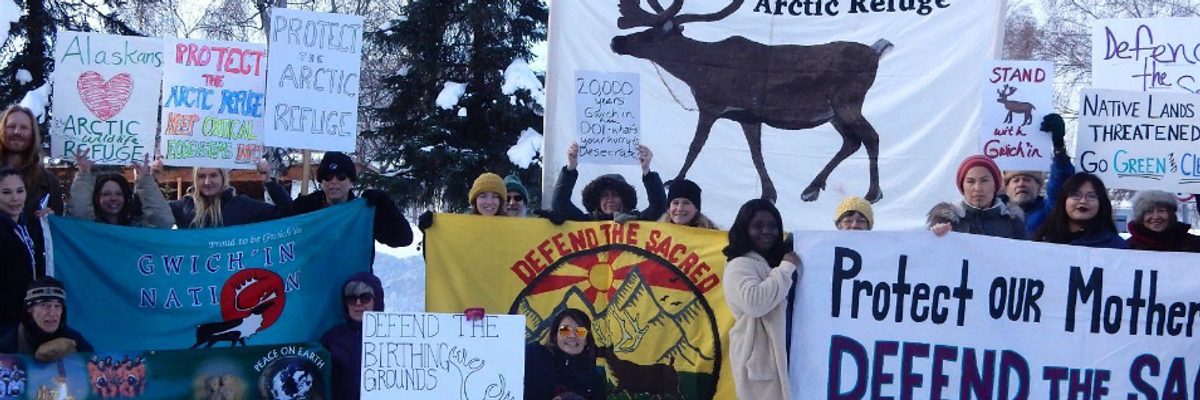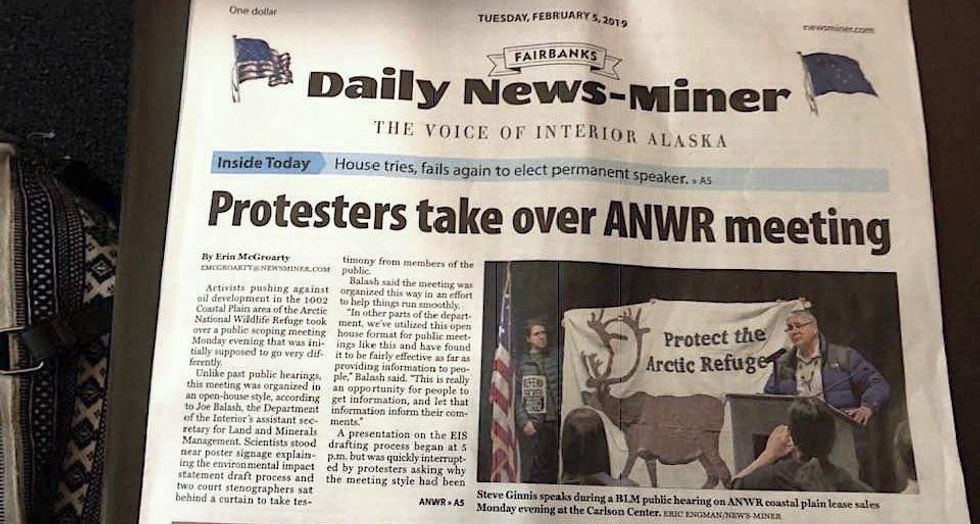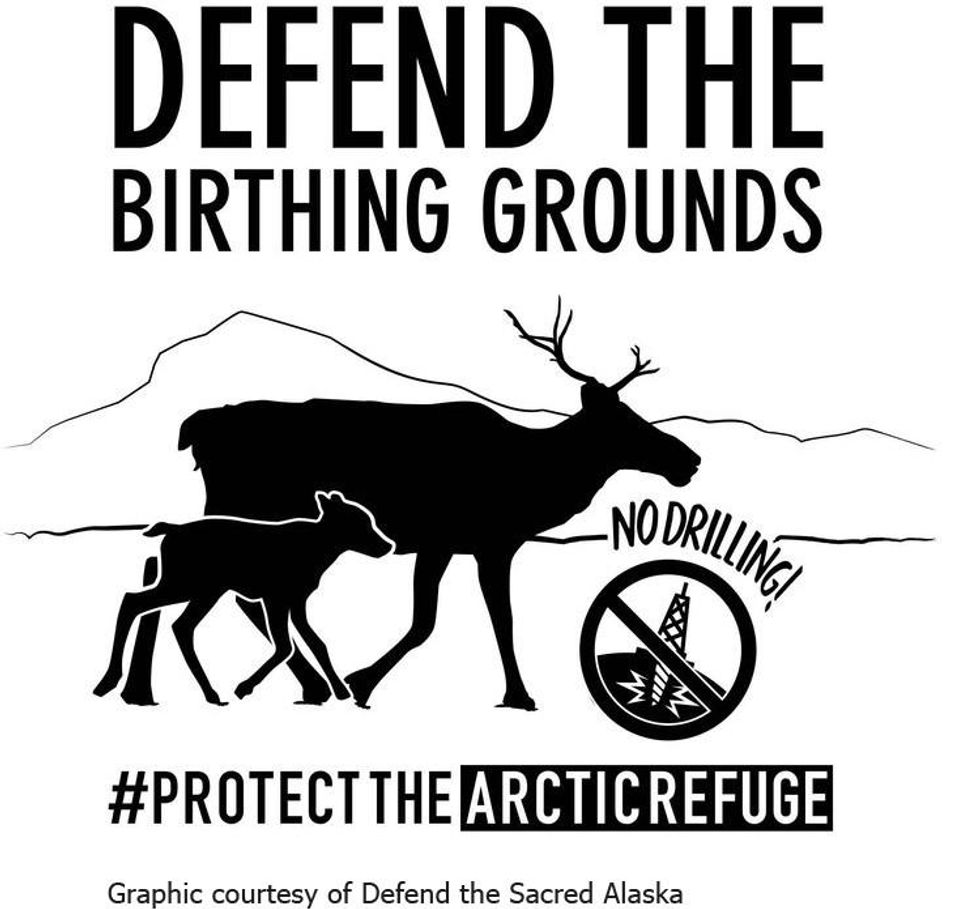Signatories' Note:We are inviting teachers and scholars--elementary and secondary school teachers, college and university faculty, graduate students, independent scholars and writers, investigative journalists, librarians, editors, museum professionals, and other educators and researchers--from the United States, Canada, and around the world to join us in the campaign to protect the Arctic National Wildlife Refuge and uphold Indigenous Rights. This letter with all signatories will be submitted to the Bureau of Land Management on March 13, 2019, the deadline for public comments on the draft Environmental Impact Statement for the Coastal Plain Oil and Gas Leasing Program. [To endorse this letter, send an email to thelastoil@unm.edu, with your name, affiliation, and state/province/country.]
As teachers and scholars from across the United States, Canada, and other parts of the world, we are united in our opposition to oil and gas exploration and drilling in the Coastal Plain of the Arctic National Wildlife Refuge in Alaska. We strongly condemn the draft Environmental Impact Statement (EIS) for the Coastal Plain Oil and Gas Leasing Program and the rushed process by which the Bureau of Land Management (BLM) prepared the document. Downplaying the dangers of expanding fossil fuel development in the Arctic, and disregarding scientific data and concerns raised by Indigenous peoples, the BLM is also shutting the public out of the process, undermining a core purpose of the National Environmental Policy Act.
Fossil fuel development in the Coastal Plain would devastate an Arctic nursery of global significance. It would violate human rights, jeopardize food security, and threaten the health and safety of Indigenous communities. It would contribute to the escalating crises of climate change and biological annihilation. The Arctic Refuge is an irreplaceable ecological treasure. Its fate should not be decided on an expedited timeline that prioritizes outcome over process to benefit the oil industry and its allies.
Ever since drilling proponents snuck an Arctic Refuge leasing provision into the 2017 Tax Cuts and Jobs Act, the Trump administration has been moving aggressively to rush through the required Environmental Impact Statement. During the scoping phase of the EIS, the BLM held only one public hearing outside of Alaska--in Washington, DC, on a Friday night in mid-June 2018. Still, a large number of people showed up to voice their concerns about the ecological, cultural, and climate impacts of drilling in the Arctic Refuge.
Dismissing the concerns raised by the public and Indigenous peoples and "relying on outdated and incomplete science," the BLM hastily assembled a draft EIS and released it on December 20, 2018, the day before the longest government shutdown in US history began.
The Neets'aii Gwich'in tribal governments of Arctic Village and Venetie, who worked in a government-to-government capacity in the EIS process, denounced the BLM draft. In a press release, the tribes claimed: "The draft goes so far as to boldly declare that oil and gas development in the caribou calving grounds will have no impact at all on the Tribe's subsistence hunting practices." Equally important is that the government did not adequately consult the tribes prior to the release of the document. "Today's release was done with no prior notification to our Tribal Councils, who have met with the BLM for months on a government-to-government basis," said Native Village of Venetie Tribal Government Executive Director Tonya Garnett. "The total lack of regard to our tribal governments on an issue of such importance really demonstrates how BLM leadership views their trust responsibility to our Tribes."
The draft EIS set the deadline for public comments to end on February 11, 2019. On December 21, 2018, the Arctic Village and Venetie tribal governments were joined by a coalition of environmental and Indigenous human rights organizations in submitting requests to extend the public comment period--to April 29, 2019--to ensure robust participation by the interested public. On January 14, 2019, in the midst of the government shutdown, the coalition submitted additional requests, reiterating the need for the extension of the public comment period and asking that additional public hearings be held across the nation so that members of the public outside of Alaska are given an opportunity to have their voices heard. Finally, the coalition requested that notice of the hearings be provided at least two weeks prior to the first hearing date to give the public sufficient time to prepare remarks.
When the BLM announced its plans on January 30, 2019, the agency failed to respond to the requests from the coalition and instead offered a much shorter extension until March 13. The BLM also announced only one public hearing outside of Alaska--again, as during the scoping phase, in Washington, DC. But this second round of hearings was structured on an even more compressed timescale to invite even less public input. The BLM stipulated that all public hearings be finished within a much shorter window of time--starting on February 4 and ending on February 13--and that the first hearing would happen just two business days after the announcement, not the two-week notice requested by the coalition. These decisions underscore the Trump administration's rampant and repeated efforts to stifle public participation in the process.

Indeed, the first BLM hearing, held in Fairbanks on February 4, did not even include a public forum: it was merely an "open house" information session for agency officials to provide an overview of the draft EIS. Gwich'in and Inupiat elders and leaders spoke out against this injustice, and demanded the right to be heard. "We are beyond frustrated that our elders are not allowed to speak today," one leader explained. Tribal members and grassroots groups--including Defend the Sacred Alaska, Native Movement Alaska, and the Fairbanks Climate Action Coalition--joined together to turn the anti-democratic charade into what one participant called a "People's Hearing."
The voices of the people need to be heard, because the BLM's rushed process has resulted in a flawed environmental review.
The draft EIS fails to address the ecological impacts of drilling. Fossil fuel development would degrade the habitat of the Porcupine Caribou Herd as well as that of migratory birds, polar bears, and other creatures. More than 200,000 caribou embark every year on the longest land migration of any animal on earth, journeying from their wintering grounds in Canada and Alaska to the Coastal Plain, where they calve and nurse their young. According to caribou biologists, the entirety of the calving and nursing grounds that stretch from the Arctic Refuge to the adjacent Ivvavik National Park in the Yukon Territory of Canada should be protected if the herd is to survive and thrive. With caribou herds across Canada and the circumpolar world in severe decline, the Department of the Interior should respect scientific and traditional ecological knowledge to sustain this transnational herd. Likewise, the draft EIS minimizes development impacts on the nesting and feeding habitats of millions of birds that migrate to the refuge from all fifty US states and all over the world. Nor does it adequately consider the impacts on polar bears, now listed as threatened under the Endangered Species Act, as their traditional sea ice habitat continues to disappear due to rapid Arctic warming. As we are in the midst of what scientists call biological annihilation, these impacts on wildlife need to be considered fully, not ignored or minimized to expedite drilling.
The draft EIS fails to address Indigenous rights and environmental justice. For the Gwich'in communities on both sides of the US-Canada border, the prospect of drilling represents an existential threat to their culture. The Gwich'in have relied upon the Porcupine Caribou Herd for their nutritional, cultural, and spiritual sustenance for millennia. To them, the Coastal Plain is Iizhik Gwats'an Gwandaii Goodlit (the Sacred Place Where Life Begins). Their food security, human rights, and cultural future are all stake in this decision. For many Inupiat people who call the area home, fossil fuel development would lead to increased social stress and air pollution with potentially severe health impacts on community members. The dangerous levels of toxic pollutants emitted by drilling could cause respiratory illnesses and other health problems, as has been documented in Nuiqsut following the development of the Alpine oil field. Indigenous voices must be heard, not marginalized and brushed aside in the rush to develop.
The draft EIS fails to address climate change. Fossil fuel extraction would contribute to further warming of the already rapidly-warming Arctic--an action that would affect the whole earth, as the Arctic is a critical integrator of our planet's climate systems. As climate scientists keep telling us, we are living through a pivotal moment in history, a time in which the US and other nations around the world need to transition to a sustainable energy future. Deciding not to drill in the Arctic Refuge would be a crucial step in this direction.
Instead of racing to turn a wildlife sanctuary into an oil field, the BLM needs to assess the full impacts of drilling on the ecological, cultural, wilderness, and subsistence values of the Arctic Refuge. The fossil fuel industry has already developed large portions of northern Alaska. The Coastal Plain of the Arctic Refuge--a contiguous stretch of unparalleled public land that constitutes about 5% of Alaska's Arctic coast--should be protected permanently not auctioned off at breakneck speed.
Since the Trump administration is attempting to complete this significant environmental review in a rushed and undemocratic manner, environmental and Indigenous activists have decided to take ownership of the process and create their own democratic structures. The coalition has organized a series of Public Community Hearings in March. Independent of the BLM's hasty and flawed process, these hearings will amplify voices of the public and highlight the administration's suppression of public participation. The public hearings represent a democratic push from below, an effort to enlist--rather than exclude--all people in this critical environmental debate. The coalition has scheduled public hearings in three cities: Albuquerque, New Mexico, on March 5; Denver, Colorado, on March 8; and Seattle, Washington (date will be announced soon on the letter web-page).
As teachers and scholars, we know that younger generations are worried about the escalating dangers to our planet's biological, climate, and life-support systems. The short-term drive to drill in the Arctic undercuts their hopes for a sustainable future. The natural and cultural values of the Arctic Refuge far exceed any oil that may lie beneath the Coastal Plain. Rather than rushing to lease and drill, the US government should keep this cherished place and vibrant ecosystem protected for generations to come.
Sincerely,
Rosemary Ahtuangaruak (Inupiaq), Arctic Indigenous Scholar, Arctic Research Consortium of the United States (Alaska, USA)
Subhankar Banerjee, Lannan Chair and Professor of Art and Ecology, University of New Mexico (New Mexico, USA)
Finis Dunaway, Professor of History, Trent University (Ontario, Canada)
Norma Kassi (Vuntut Gwitchin), Director of Indigenous Collaboration at the Arctic Institute of Community-Based Research (Yukon, Canada)



